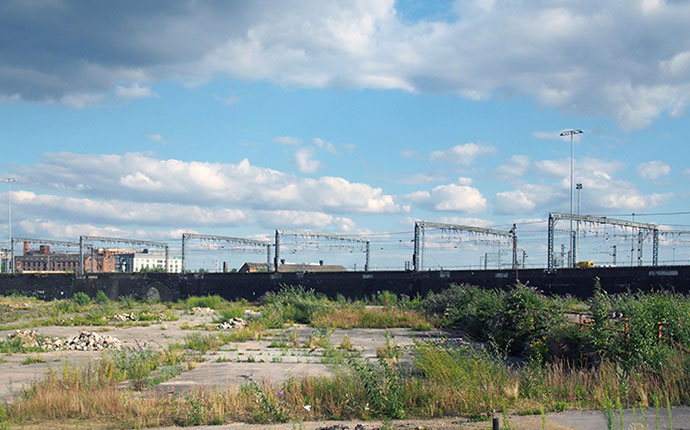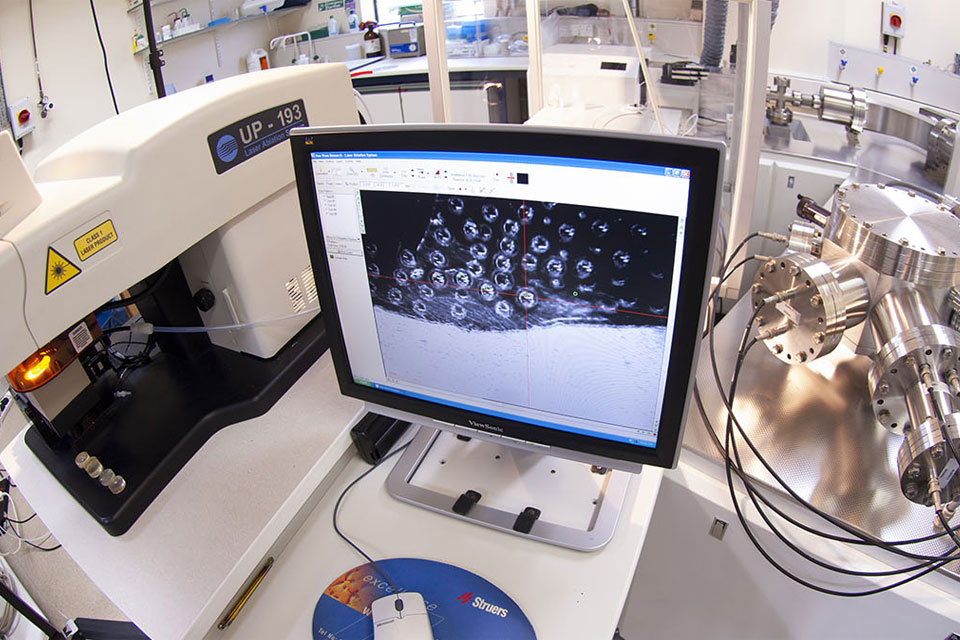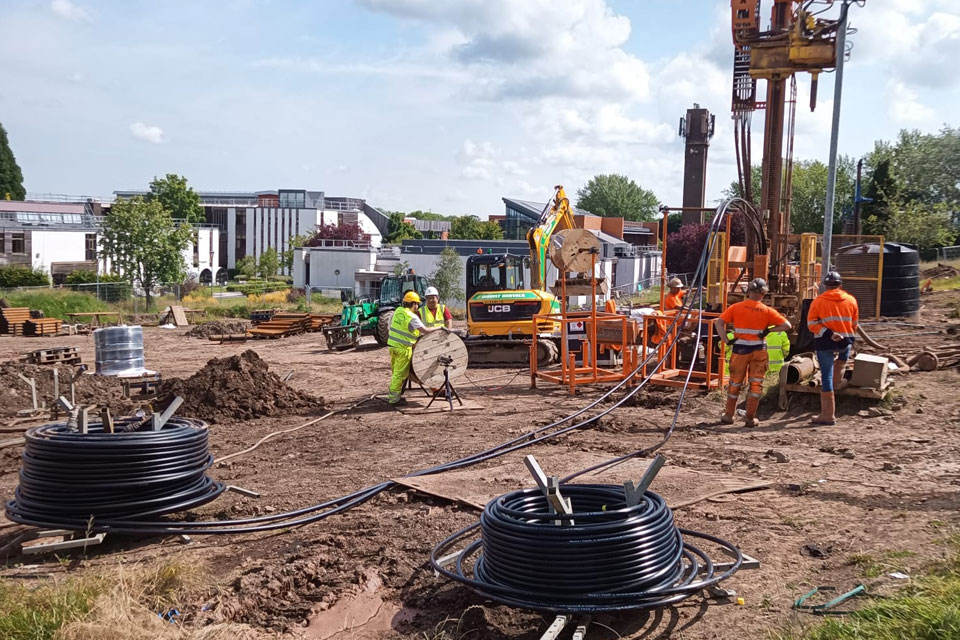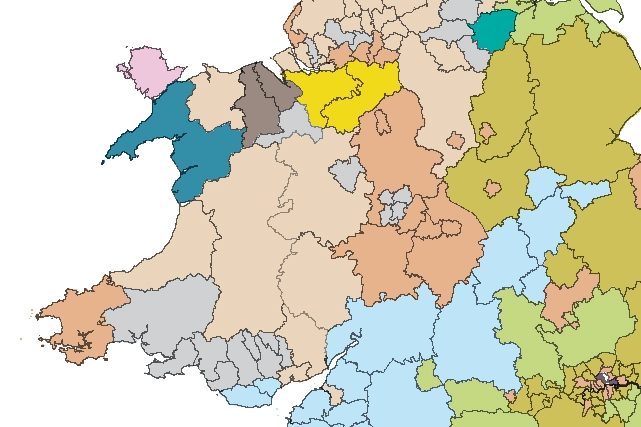BGS partners with Arcadis in £70 000 research programme to support brownfield development
New research will explore microorganisms with the potential to breakdown hazardous chemicals in the environment.
15/10/2020 By BGS Press
New research will explore microorganisms with the potential to breakdown hazardous chemicals in the environment.
The British Geological Survey (BGS) will take part in a novel £70 000 research programme to support the clean up of brownfield sites using natural biological processes, in partnership with Arcadis, a leading global design and consultancy organisation for natural and built assets.
The research will be used to understand and evaluate how microorganisms naturally present in contaminated soil and groundwater can be used to bioremediate the chemical 1,4-dioxane, an emerging contaminant that is increasingly detected in groundwater and recognised as a potential risk to human health and the environment around the world.
The project is being funded by the Environmental Biotechnology Network (EBNet), with a contribution from Arcadis, and is expected to take around twelve months to complete.
We need to better understand the wide range of legacy chemicals present in post-industrial brownfield land. Many of these emerging contaminants have either previously not been looked for or detected, but they are hazardous to people and to the environment.
The more we understand them, the better we can make decisions about how to remove them from post-industrial land to make sites safe and suitable for redevelopment.
BGS microbiologist Simon Gregory.
Reported health problems from short-term exposure to 1,4-dioxane include breathing problems, vertigo, drowsiness, headaches and skin irritation. Long-term exposure can lead to kidney and liver damage, and can even be fatal.
Due to its high solubility and low degradability under some conditions, 1,4-dioxane can be a challenge to remove from soil and groundwater. However, it is known that it can be degraded by soil microorganisms possessing some types of monooxygenase enzymes, a family of enzymes that can help to breakdown a wide range of chemicals including many organic pollutants.
Dr Monica Heintz, a geoscientist at Arcadis specialising in natural attenuation and bioremediation, said: ‘While biodegradation of 1,4-dioxane has been demonstrated, the microorganisms responsible for this process remain under-characterised. This research will increase our understanding of microorganisms responsible for 1,4-dioxane biodegradation and will lead to genetic surveys that can be used to assess biodegradation of 1,4-Ddoxane at sites around the world.’
BGS and Arcadis will gather information using a range of DNA-based techniques to quantify and explore the diversity of organisms that produce monooxygenase enzymes in contaminated sites and understand which enzymes are most effective at biodegradation.
This approach to characterising natural attenuation mechanisms will allow confidence in the ability of microorganisms to detoxify 1,4-dioxane and provide a sustainable, cost-effective management solution for brownfield stakeholders.
Dr Ian Ross, Senior Technical Director at Arcadis UK.
Relative topics
For further information please contact:
Call: +44 (0)7790 607 010.
(Please do not text this number. We accept calls or email only.)
Email: bgspress@bgs.ac.uk
Notes
- A brownfield site is an area that has been used before and is typically disused or derelict Such sites are usually abandoned areas in towns and cities that have been used previously for industrial and commercial purposes.
- Historical industrial processes often produced harmful byproducts, residues and wastes that were poorly managed. The chemicals contained in these legacy materials can threaten human health and the environment.
- Examples of land uses highly likely to have resulted in contamination include chemical works, landfill sites and textile mills.
- Funding for the project is being awarded by the Environmental Biotechnology Network (EBNet), one of 6 Phase II networks in industrial biotechnology and bioenergy funded primarily by the Biotechnology and Biological Sciences Research Council (BBSRC) with additional funding from the Engineering and Physical Sciences Research Council (EPSRC).
British Geological Survey
The British Geological Survey (BGS) is a world-leading applied geoscience research centre that is part of UK Research and Innovation (UKRI) and affiliated to the Natural Environment Research Council (NERC). BGS core science provides objective and authoritative geoscientific data, information and knowledge to inform UK Government on the opportunities and challenges of the subsurface. It undertakes national and public good research to understand earth and environmental processes in the UK and globally. Please see www.bgs.ac.uk
Arcadis
Arcadis is the leading global design and consultancy firm for natural and built assets. Applying our deep market sector insights and collective design, consultancy, engineering, project and management services, we work in partnership with our clients to deliver exceptional and sustainable outcomes throughout the lifecycle of their natural and built assets. We are 28 000 people, active in over 70 countries, that generate €3.5 billion in revenues. We support UN-Habitat with knowledge and expertise to improve the quality of life in rapidly growing cities around the world. Please see www.arcadis.com/en/global/
Related news

Call for new members and Chair to join the NERC facilities steering committees
25/02/2026
New members are needed to join the committees over the next four years.

Your views wanted – developing a ‘Geothermal energy subsurface data portfolio’
24/02/2026
BGS is aiming to support the growth of the sector by providing the best-available, location-specific geothermal and ground source heat information as an accessible product or service.

Map of BGS BritPits showing the distribution of worked mineral commodities across the country
18/02/2026
BGS’s data scientists have generated a summary map of the most commonly extracted mineral commodities by local authority area, demonstrating the diverse nature of British mineral resources.

Funding awarded to map the stocks and flows of technology metals in everyday electronic devices
12/02/2026
A new BGS project has been awarded Circular Electricals funding from Material Focus to investigate the use of technology metals in everyday electrical items.

New UK/Chile partnership prioritises sustainable practices around critical raw materials
09/02/2026
BGS and Chile’s Servicio Nacional de Geología y Minería have signed a bilateral scientific partnership to support research into critical raw materials and sustainable practices.

Extensive freshened water confirmed beneath the ocean floor off the coast of New England for the first time
09/02/2026
BGS is part of the international team that has discovered the first detailed evidence of long-suspected, hidden, freshwater aquifers.

Funding secured to help mitigate ground risk in UK construction sector
05/02/2026
The BGS Common Ground project has been awarded new funding to help unlock the value of ground investigation data.

Can sandstones under the North Sea unlock the UK’s carbon storage potential?
02/02/2026
For the UK to reach its ambitious target of storing 170 million tonnes of carbon dioxide per year by 2050, it will need to look beyond the current well-studied geographical areas.

Quaternary UK offshore data digitised for the first time
21/01/2026
The offshore wind industry will be boosted by the digitisation of a dataset showing the Quaternary geology at the seabed and the UK’s shallow subsurface.

Suite of ten new soil reference materials released
02/01/2026
BGS has a longstanding track record of producing high-quality reference materials and has released ten new soil reference materials.

Perth and Kinross tops the UK’s earthquake activity charts for 2025
29/12/2025
Seismologists at BGS have published data on the number of seismic events over the past 12 months with over 300 earthquakes recorded.

BGS awarded funding to support Malaysia’s climate resilience plan
17/12/2025
The project, funded by the Foreign, Commonwealth & Development Office, will focus on minimising economic and social impacts from rainfall-induced landslides.



